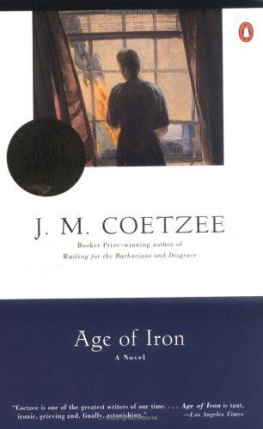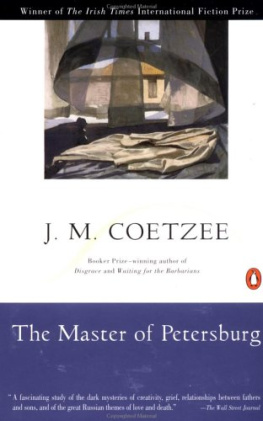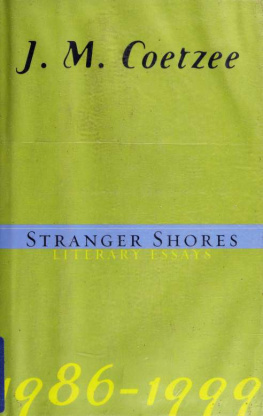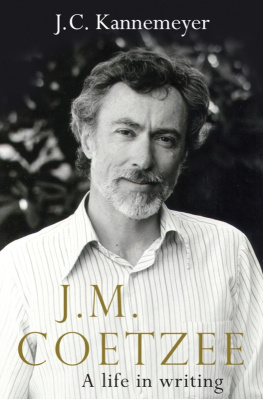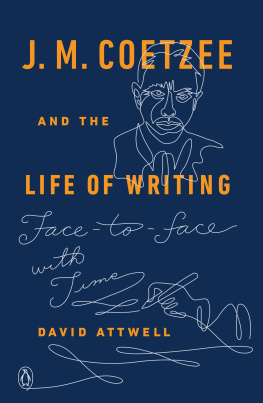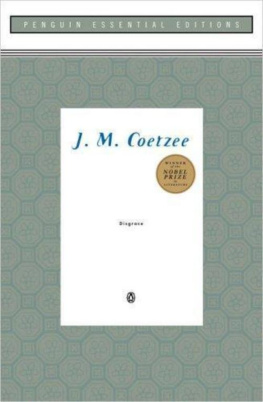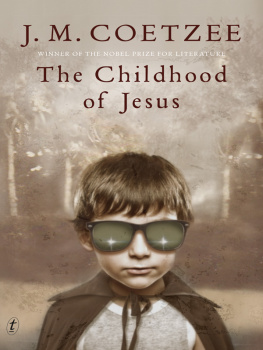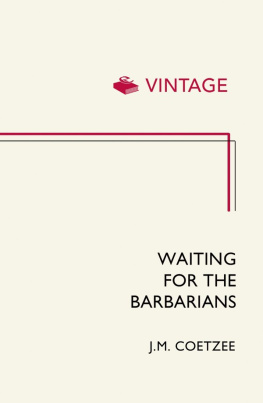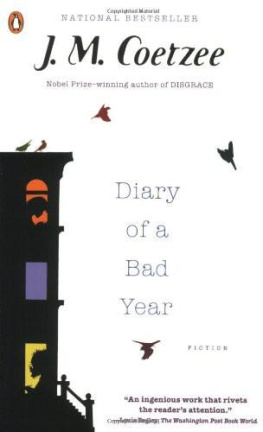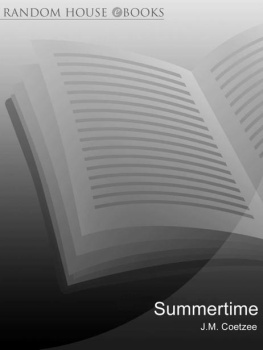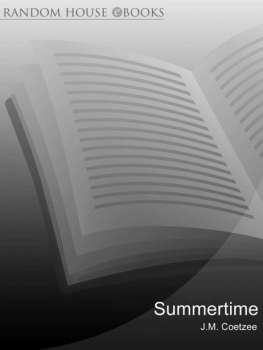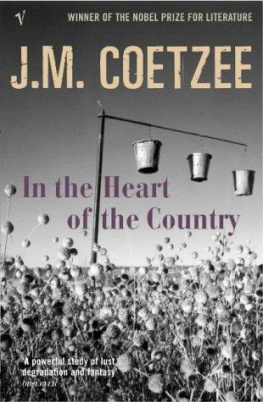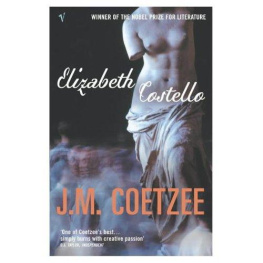J.M Coetzee - Age of Iron
Here you can read online J.M Coetzee - Age of Iron full text of the book (entire story) in english for free. Download pdf and epub, get meaning, cover and reviews about this ebook. year: 1990, genre: Detective and thriller. Description of the work, (preface) as well as reviews are available. Best literature library LitArk.com created for fans of good reading and offers a wide selection of genres:
Romance novel
Science fiction
Adventure
Detective
Science
History
Home and family
Prose
Art
Politics
Computer
Non-fiction
Religion
Business
Children
Humor
Choose a favorite category and find really read worthwhile books. Enjoy immersion in the world of imagination, feel the emotions of the characters or learn something new for yourself, make an fascinating discovery.
- Book:Age of Iron
- Author:
- Genre:
- Year:1990
- Rating:3 / 5
- Favourites:Add to favourites
- Your mark:
- 60
- 1
- 2
- 3
- 4
- 5
Age of Iron: summary, description and annotation
We offer to read an annotation, description, summary or preface (depends on what the author of the book "Age of Iron" wrote himself). If you haven't found the necessary information about the book — write in the comments, we will try to find it.
Age of Iron — read online for free the complete book (whole text) full work
Below is the text of the book, divided by pages. System saving the place of the last page read, allows you to conveniently read the book "Age of Iron" online for free, without having to search again every time where you left off. Put a bookmark, and you can go to the page where you finished reading at any time.
Font size:
Interval:
Bookmark:
J. M. Coetzee
Age of Iron
For V.H.M.C. (1904-I985) z.c. (1912-1988) N.G.C. (1966-I989)
I
There is an alley down the side of the garage, you may remember it, you and your friends would sometimes play there. Now it is a dead place, waste, without use, where windblown leaves pile up and rot. Yesterday, at the end of this alley, I came upon a house of carton boxes and plastic sheeting and a man curled up inside, a man I recognized from the streets: tall, thin, with a weathered skin and long, carious fangs, wearing a baggy grey suit and a hat with a sagging brim. He had the hat on now, sleeping; with the brim folded under his ear. A derelict, one of the derelicts who hang around the parking lots on Mill Street, cadging money from shoppers, drinking under the flyover, eating out of refuse cans. One of the homeless for whom August, month of rains, is the worst month. Asleep in his box, his legs stretched out like a marionette's, his jaw agape. An unsavoury smell about him urine, sweet wine, mouldy clothing, and something else too. Unclean.
For a while I stood staring down on him, staring and smelling. A visitor, visiting himself on me on this of all days.
This was the day when I had the news from Dr Syfret. The news was not good, but it was mine, for me, mine only, not to be refused. It was for me to take in my arms and fold to my chest and take home, without headshaking, without tears.
'Thank you, doctor,' I said: 'thank you for being frank.' 'We will do everything we can,' he said, 'we will tackle this together.' But already, behind the comradely front, I could see he was withdrawing. Sauve qui peut. His allegiance to the living, not the dying,
The trembling began only when. I got out of the car, By the time I had closed the garage door I was shaking all over: to still it I had to clench my teeth, grip my handbag. It was then that I saw the boxes, saw him.
'What are you doing here?' I demanded, hearing the irritation in my voice, not checking it. 'You can't stay, you must go.'
He did not stir, lying in his shelter, looking up, inspecting; the winter stockings, the blue coat, the skirt with whose hang there has always been something wrong, the grey hair cut by a strip of scalp, old woman's scalp, pink, babyish.
Then he drew in his legs and leisurely got up. Without a word, he turned his back on me, shook out the black plastic, folded, it in half, in quarters, in eighths. He produced a bag (Air Canada, it said) and zipped it shut. I stood aside. Leaving behind the boxes, an empty bottle and a smell of urine, he passed me. His trousers sagged; he hitched them up. I waited to be sure he had gone, and heard him stow the plastic in the hedge from the other side.
Two things, then, in the space of an hour: the news, long dreaded, and this reconnaissance, this other annunciation. The first of the carrion-birds, prompt, unerring. How long can I fend them off? The scavengers of Cape Town, whose number never dwindles. Who go bare and feel no cold. Who sleep outdoors and do not sicken. Who starve and do not waste. Warmed from within by alcohol. The contagions and i infections in their blood consumed in liquid flame. Cleaners-up after the feast. Flies, dry-winged, glazen-eyed, pitiless. My heirs.
With what slow steps did I enter this empty house, from which every echo has faded, where the very tread of footsole on board is flat and dull! How I longed for you to be here, to hold me, comfort me! I begin to understand the true meaning of the embrace. We embrace to be embraced. We embrace our children to be folded in the arms of the future, to pass ourselves on beyond death, to be transported. That is how it was when I embraced you, always. We bear children in order to be mothered by them. Home truths, a mother's truth: from now to the end that is all you will hear from me. So: how I longed for you! How I longed to be able to go upstairs to you, to sit on your bed, run my fingers through your hair, whisper in your ear as I did on school mornings, 'Time to get up!' And then, when you turned over, your body blood-warm, your breath milky, to take you in my arms in what we called 'giving Mommy a big hug, the secret meaning of which, the meaning never spoken, was that Mommy should not be sad, for she would not die but live on in you.
To live! You are my life; I love you as I love life itself. In the mornings I come out of the house and wet my finger and hold it up to the wind. When, the chill is from the north-west, from your quarter, I stand a long time sniffing, concentrating my attention in the hope that across ten thousand miles of land and sea some breath will reach me of the milkiness you still carry with you behind your ears, in the fold of your neck.
The first task laid on me, from today: to resist the craving to share my death. Loving you, loving life, to forgive the living and take my leave without bitterness. To embrace death as my own, mine alone.
To whom this writing then? The answer: to you but not to you; to me; to you in me.
All afternoon I tried to keep myself busy, cleaning out drawers, sorting and discarding papers. At dusk I came out again. Behind the garage the shelter was set up as before with the black plastic neatly spanned over it. Inside lay the man, his legs curled up, and a dog beside him that cocked its ears and wagged its tail. A collie, young, little more than a pup, black, with white points.
'No fires,' I said. 'Do you understand? I want no fires, I want no mess.'
He sat up, rubbing his bare ankles, staring around as if not knowing where he was, A horsy, weatherbeaten face with the puffiness around the eyes of an alcoholic. Strange green eyes: unhealthy.
'Do you want something to eat?' I said.
He followed me to the kitchen, the dog at his heels, and waited while I cut him a sandwich. He took a bite but then seemed to forget to chew, standing against the door-jamb with his mouth full, the light shining into his vacant green eyes, while the dog whined softly. 'I have to clean up,' I said impatiently, and made to close the door on him. He went off without a murmur; but before he turned the corner I was sure I saw him toss the sandwich away, and the dog dive after it.
There were not so many of these homeless people in your time. But now they are part of life here. Do they frighten me? On the whole, no. A little begging, a little thieving; dirt, noise, drunkenness; no worse. It is the roaming gangs I fear, the sullen-mouthed boys, rapacious as sharks, on whom the first shade of the prison-house is already beginning to close. Children scorning childhood, the time of wonder, the growing-time of the soul. Their souls, their organs of wonder, stunted, petrified. And on the other side of the great divide their white cousins soul-stunted too, spinning themselves tighter and tighter into their sleepy cocoons. Swimming lessons, riding lessons, ballet lessons; cricket on the lawn; lives passed within walled gardens guarded by bulldogs; children of paradise, blond, innocent, shining with angelic light, soft as putti. Their residence the limbo of the unborn, their innocence the innocence of bee-grubs, plump and white, drenched in honey, absorbing sweetness through their soft skins. Slumbrous their souls, bliss-filled, abstracted.
Why do I give this man food? For the same reason I would feed his dog (stolen, I am sure) if it came begging. For the same reason I gave you my breast. To be full enough to give and to give from one's fullness: what deeper urge is there? Out of their withered bodies even the old try to squeeze one last drop. A stubborn will to give, to nourish. Shrewd was death's aim when he chose my breast for his first shaft.
This morning, bringing him coffee, I found him urinating into the drain, which he did without any appearance of shame.
'Do you want a job of work?' I said. 'There are plenty of jobs I can give you.'
Next pageFont size:
Interval:
Bookmark:
Similar books «Age of Iron»
Look at similar books to Age of Iron. We have selected literature similar in name and meaning in the hope of providing readers with more options to find new, interesting, not yet read works.
Discussion, reviews of the book Age of Iron and just readers' own opinions. Leave your comments, write what you think about the work, its meaning or the main characters. Specify what exactly you liked and what you didn't like, and why you think so.

